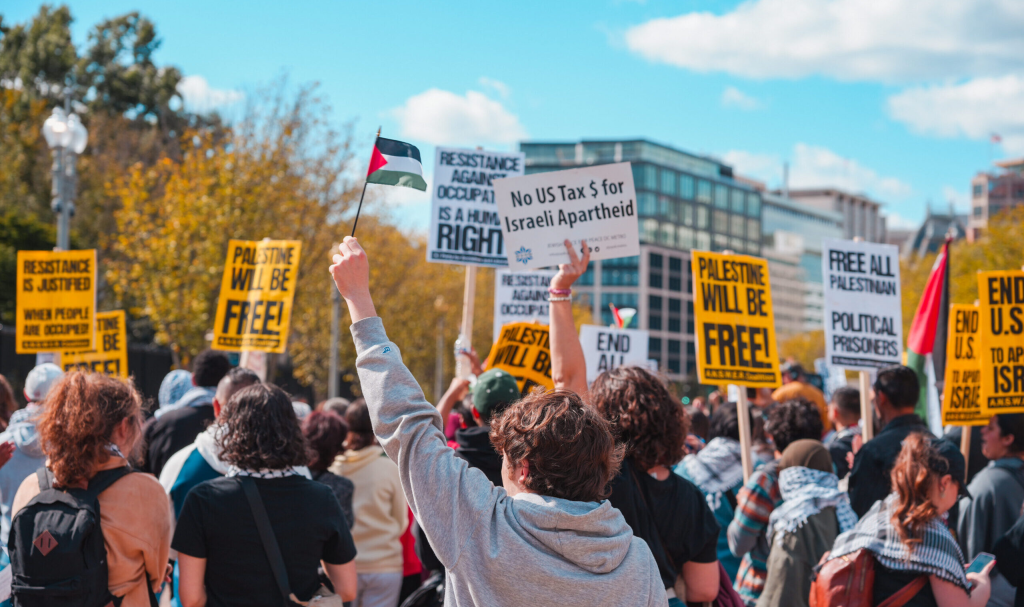Debunking the misinformation of the current college protests

A young vibrant valedictorian at the University of Southern California is preparing for her speech in front of thousands of her peers, faculty, and their families. It’s nerve-racking, but surely exciting. What might she share with this crowd? What wisdom does she wish to grant them before they part ways? This is something USC valedictorian, Asna Tabassum, didn’t even get the chance to decide before the university canceled not only her speech, but the entire commencement ceremony. She believes it’s because of her pro-Palestinian views.
“The intensity of feelings, fueled by both social media and the ongoing conflict in the Middle East, has grown to include many voices outside of USC and has escalated to the point of creating substantial risks relating to security and disruption at commencement,” Andrew Guzman, the university’s provost wrote. He did not explicitly mention the valedictorian’s politics. Tabassum is a proud first-generation South-Asian Muslim who received her minor in resistance to genocide studies, and has explicitly stated her views about Israel’s actions on social media. Despite neighboring colleges frequently holding speeches for right-wing extremists like Milo Yiannopoulos, this was a bridge too far. Not only did this decision spark protests among USC students, but it also shined a light on college protests nationwide.
College Censorship
Right here in Atlanta, change is happening. Local universities like Kennesaw State University and Emory University have protested endlessly for months. In conjunction with the Party for Socialism and Liberation’s Atlanta chapter and student organizers, Kennesaw has demanded a permanent ceasefire. Emory shares a similar story to many other colleges around the country. The university has unwaveringly supported Israel and students have gathered to demand a divestment from the zionist state.
Discussion about college protests has exploded in the media, with the coverage mainly surrounding universities like Yale, NYU, and Columbia. These students have been accused of antisemitism, supporting the “death of America,” and inciting violence. In a fog of misinformation, it is best to set the record straight. What is really happening on these campuses? The story, if anything, demonstrates the opposite of their accusations.
At Yale — similarly to their NYU and Columbia peers — the students have set up encampments. For the uninitiated, encampments are groups of tents or other forms of shelter historically used by the military, but can also be used in other situations like protests. The students at Yale are also demanding that their school divest from military manufacturers that supply weapons to Israel. Along with encampments, they blocked traffic around the campus. Despite this form of protest being used since the Civil Rights Movement in the ’60s, the media has unfavorably covered it as if it were radical and new. The university has cracked down on these spaces leading to unjustifiable arrests. According to Reuters, more than 45 students have been arrested at Yale.
At NYU, tensions between protestors and the police have only escalated. After nightfall, the encampments were broken up after the university asked police to enforce trespassing violations. The protestors were warned that they would face consequences if they didn’t vacate the plaza. Police took down tents and tussled with students as they yelled: “We will not stop! We will not rest! Disclose! Divest!”
Columbia has been at the center of media coverage’s attention over the students and the university’s actions. Police arrested more than 100 students for trespassing, and the university also suspended dozens of students, one of whom is Congresswoman Ilhan Omar’s daughter. There have been reports of suspended students’ belongings immediately being thrown out of their dorms without warning and violence against Jewish and Muslim protestors. On NBC, students from Columbia described racism and slurs being hurled at them, hijabis being ripped from people’s heads, and being sprayed with toxic chemicals. There have also been reports of students who were jailed suffering asthma attacks and seizures. Despite this, students aren’t backing down and have continued to protest Israel’s actions. Recently, faculty members have also joined the students in solidarity on Passover, and at times will bring their classes to the encampments.
Columbia President Minouche Shafik has canceled in-person classes to “deescalate the rancor and give us all a chance to consider the next steps.” This statement comes after donors have threatened to cut off support to the university. There is immense national pressure to fight back against these protestors and maintain an alliance with Israel. Even the Prime minister of Israel, Bibi Netanyahu, released a video criticizing American universities. Yet, Columbia students are tenaciously carrying on the university’s long history of anti-war protests.
Media Coverage
Both liberal and conservative media outlets have taken part in gross, biased coverage of these protests. A narrative that pro-Palestianian students are antisemitic has prevailed, along with a slew of other misinformation. CNN recently released an opinion piece from the Director of the Anti-Defamation League (ADL), Jonathan Greenblatt. The ADL has historically been a zionist institution and Greenblatt’s take only reinstated its pro-Israel stance. In this piece, he points to fringe and extreme protestors, continues the narrative that they are spreading antisemitism, and calls for President Shafik to get the NYPD involved. This claim of antisemitism is completely false. Some anti-zionist Jewish students are a part of the protests, and the Columbia encampment celebrated Passover and continues to provide spaces for both Muslim and Jewish students to practice their faith. It is people like Greenblatt who demand Jewish people fit into a certain box that ends up excluding others who aren’t a part of the in-group. The truth is that Israel is not representative of all Jewish people, despite what Greenblatt wants to believe.
This focus on edge cases distracts from what these students are attempting to bring light to. It’s not surprising that when thousands gather, some may have extreme beliefs or even become disingenuous to the movement. Some of these protestors could also be astroturfers, attempting to infiltrate the movement.
“Even in recent days, we’ve seen harassment and calls for violence against Jews,” President Joe Biden said in a statement. “This blatant antisemitism is reprehensible and dangerous — and it has absolutely no place on college campuses, or anywhere in our country.” Biden’s statement comes on the heels of Congress’ overwhelming passing of a resolution that “From the river to the sea, Palestine will be free” is antisemitic. According to the Times of Israel, the motion was only opposed by 34 Democrats and one Republican. Republican representative Anthony D’Esposito claims, “This slogan communicates one thing and one thing only. It is not human rights, and it is certainly not peace. It is the violent destruction of the State of Israel.”
“We firmly reject any form of hate or bigotry and stand vigilant against non-students attempting to disrupt the solidarity being forged among students — Palestinian, Muslim, Arab, Jewish, Black, and pro-Palestinian classmates and colleagues,” the Columbia students stated. Despite this frustrating framing, Columbia students have stated they desire the focus to stay on the atrocities in Gaza and not them.

The reaction from these universities is the most disheartening part for me. The police presence, the misinformation, and the lack of attention to the actual messages from these protestors — it’s sad. We are repeating history. Almost 53 years ago this May, Kent State University protestors faced a similar escalation. They were justifiably protesting America’s involvement in the Vietnam War and calling for peace, similar to what these students are doing for Palestine. The Ohio Guard was called in, and they ended up shooting 13 unarmed demonstrators and murdering four of them.
Seeing pro-Palestinian students get brutalized by the police — we’ve seen this before. How could we collectively refuse to learn from our mistakes? The atrocities in Gaza have already been compared to concentration camps and the South African apartheid by scholars, and now the escalations on these campuses will be compared to Vietnam. We have to break this cycle, listen to these student demands, and be better than this! For ourselves, and for the ones who will come after us.

























